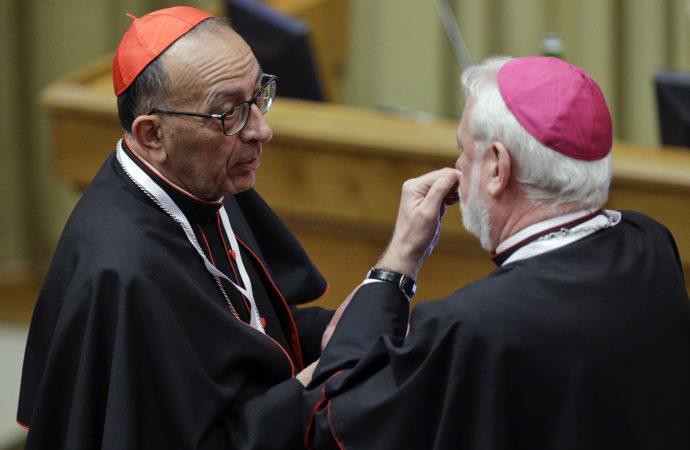|
Spain grapples with legacy of clerical sexual abuse crisis
By Inés San Martín
As the clerical sexual abuse scandals continue to work their way through the global church, bishops and religious superiors in Spain are showing similar but also contrasting reactions both to the crime of abuse and the public reactions to it. During his first remarks as bishop of Avila during his ordination, Jose Maria Gil Tamayo, former secretary and spokesman of the bishops’ conference, said on Saturday that there’s an attempt to “extend an unfair veil of suspicion over the immense multitude of priests.” He was referring to the recent publication, in several local newspapers, of allegations of clerical sexual abuse and subsequent silence and cover-up. Seeing this “veil of suspicion,” Gil Tamayo said he wanted to offer some words of “encouragement” and “support” for the local clergy, whom he thanked for their service. “Especially in these moments in which, seeing the sins and crimes that have been committed by the ecclesial community and for which we apologize and work towards their eradication and prevention,” there’s an attempt to discredit the many good priests “who serve God and the people in a faithful, self-denying and exemplary way,” he said, to a cheering crowd. Last October, the bishops’ conference announced the creation of a commission to review guidelines to address cases of clerical sexual abuse, as the current standards were created in 2010 and do not include mandatory reporting to civil authorities, instead “inviting” the families of victims and survivors to go to the police. Gil Tamayo is a member of that commission. In November, speaking to the Spanish news agency EFE, Gil Tamayo acknowledged a “conspiracy of silence” surrounding clerical sexual abuse, though he framed it within a wider context of “inaction by Spanish society.” “It’s true that the Church is bound to a more coherent standard than anyone else, but this does not exempt the rest from assuming their share of responsibility,” he said at the time. Yet the man who replaced Gil Tamayo as secretary and spokesman of the Spanish bishops, Bishop Luis Arguello, auxiliary of Valladolid, said the bishops will only do a thorough investigation of abuse within the Church “if the pope asks for it.” Referring to the upcoming Feb. 21-24 meeting summoned by Pope Francis in Rome of all the presidents of the world’s bishops’ conferences, the priest said that “in each one of our dioceses we’re taking the necessary steps,” and they’re open to the fact that, if in the February meeting a thorough investigation of the past is requested, they will “assume it.” The bishop also said cases in Spain have not “been many,” adding that nevertheless the bishops want to address abuse within the Church that might have been “hidden in the past,” though he asked for “respect of the victims,” if they want to “forget about what happened.” After saying the bishops will only do a national inquiry if the February meeting calls for it, he did say that the Spanish commission is working on implementing “preventive formative measures” and generating an education for “affectivity and sexuality” aligned with the Church’s vision so that it’s possible to “eradicate abuses as well as other types of abuses and violence,” which, according to him, are related to “mismanagement of sexual [and] affective impulses.” The attitude of the conference is different from the Jesuits of Catalonia, who ordered a thorough investigation over possible abuses that might have taken place in the past 60 years. A majority of the cases of abuse denounced in Spain were committed by priests belonging to religious orders, and in several instances, Spanish priests or religious have been accused of sexually abusing minors abroad, as is the case of over half a dozen Marist brothers who face allegations in Chile. In addition, following a decision made Nov. 14, the national conference of religious institutes met in Dec. 11 for the first of what will be “several” encounters to address the abuse crisis, during which religious superiors, both male and female, discussed suggestions made by the Pontifical Commission for the Protection of Minors and the bishops’ conferences of Spain and Chile. According to the religious, who released a statement Dec. 14, they consider it to be a “duty” to address allegations made against priests and religious, defining them as “doubly serious,” with consequences in civil law and society but even more so within the Church, as the crimes were “perpetrated by people who enjoyed the trust” of parents of the victims, the children themselves and the ecclesial community. “They suppose a behavior in flagrant contradiction with the testimony that that trust demanded,” the statement says. “They are crimes that transcend the place where they have been committed and become a global stain for consecrated Life and, therefore, for the Church,” it continues. Cardinal Juan Jose Omella, archbishop of Barcelona, referred to clerical sexual abuse when talking with COPE, the radio network of the bishops’ conference, saying that it “must be investigated” to see how far the scandal has gone. “Child abuse should never have happened in the Church,” he said, adding that the abuse of minors hasn’t exclusively affected the Church, but “it’s also in public schools, in sports environments and in society as a whole.” The cardinal said that “society is very eroticized,” and that movies invite viewers to “live sex and not love.” According to the latest polls published by the Catholic weekly Vida Nueva, the former stronghold of European Catholicism is bleeding faithful, with the Church loosing an estimated 14 percent of its people from 2005 until now, and only 66 percent of Spaniards identifying as Catholic with 3 in 10 identifying as atheist or non-believers.
|
.
Any original material on these pages is copyright © BishopAccountability.org 2004. Reproduce freely with attribution.
